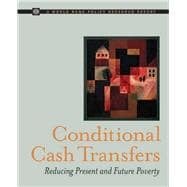
Note: Supplemental materials are not guaranteed with Rental or Used book purchases.
Purchase Benefits
Looking to rent a book? Rent Conditional Cash Transfers Reducing Present and Future Poverty [ISBN: 9780821373521] for the semester, quarter, and short term or search our site for other textbooks by Fiszbein, Ariel; Schady, Norbert R.; Ferreira, Francisco H.G.; Grosh, Margaret; Kelleher, Nial; Olinto, Pedro; Skoufias, Emmanuel. Renting a textbook can save you up to 90% from the cost of buying.
| Foreword | p. xi |
| Acknowledgments | p. xv |
| Acronyms | p. xvii |
| Overview | p. 1 |
| The CCT Wave | p. 3 |
| The Arguments for CCT | p. 8 |
| The Impacts of CCT Programs | p. 11 |
| Policy and Design Options | p. 22 |
| Complementary Interventions | p. 24 |
| CCTs in the Context of Social Protection Policies | p. 26 |
| Conclusion | p. 27 |
| Introduction | p. 29 |
| The CCT Wave | p. 31 |
| Theme and Variations | p. 34 |
| Outline of the Report and Issues Covered | p. 40 |
| The Economic Rationale for Conditional Cash Transfers | p. 45 |
| Cash Transfers: Arguments in Support and Against | p. 46 |
| The Microfoundations of Paternalism | p. 51 |
| A Political Economy Argument | p. 59 |
| Social Efficiency Arguments | p. 64 |
| Conclusion | p. 65 |
| Design and Implementation Features of CCT Programs | p. 67 |
| Targeting in Practice | p. 67 |
| Benefit Systems | p. 80 |
| Conditions: Their Definition, Compliance Monitoring, and Enforcement | p. 86 |
| Monitoring and Evaluation | p. 91 |
| Intersectoral and Interinstitutional Challenges | p. 97 |
| Conclusion | p. 100 |
| The Impact of CCTs on Consumption Poverty and Employment | p. 103 |
| Impact of CCTs on Household Consumption and Poverty | p. 104 |
| Analyzing Offsetting Behavioral Responses to CCTs | p. 114 |
| Long-Term Impacts of CCTs on Consumption | p. 123 |
| Conclusion | p. 124 |
| The Impact of CCT Programs on the Accumulation of Human Capital | p. 127 |
| CCT Program Effects on the Use of Education and Health Services | p. 128 |
| Impact of CCTs on "Final" Outcomes in Education and Health | p. 141 |
| Cash, Behavioral Changes, and Outcomes | p. 155 |
| Conclusion | p. 160 |
| CCTs: Policy and Design Options | p. 165 |
| When Is a CCT Program the Right Policy Instrument? | p. 166 |
| Designing an Efficient CCT Program | p. 172 |
| Adapting the Supply of Social Services | p. 186 |
| CCT Programs As Components of Social Protection Systems | p. 195 |
| Conclusion | p. 200 |
| Summary Tables | p. 205 |
| Review of CCT Impact Evaluations | p. 297 |
| Notes | p. 315 |
| References | p. 329 |
| Index | p. 351 |
| Boxes | |
| Efficient Redistribution in the Presence of Market Failure | p. 49 |
| Investing Early in the Life Cycle | p. 55 |
| Fairness, Merit, and the "Deserving Poor" | p. 61 |
| Proxy Means Testing Where Administrative Capacity Is Low: Cambodia's Scholarship Programs | p. 71 |
| Table of Contents provided by Ingram. All Rights Reserved. |
The New copy of this book will include any supplemental materials advertised. Please check the title of the book to determine if it should include any access cards, study guides, lab manuals, CDs, etc.
The Used, Rental and eBook copies of this book are not guaranteed to include any supplemental materials. Typically, only the book itself is included. This is true even if the title states it includes any access cards, study guides, lab manuals, CDs, etc.